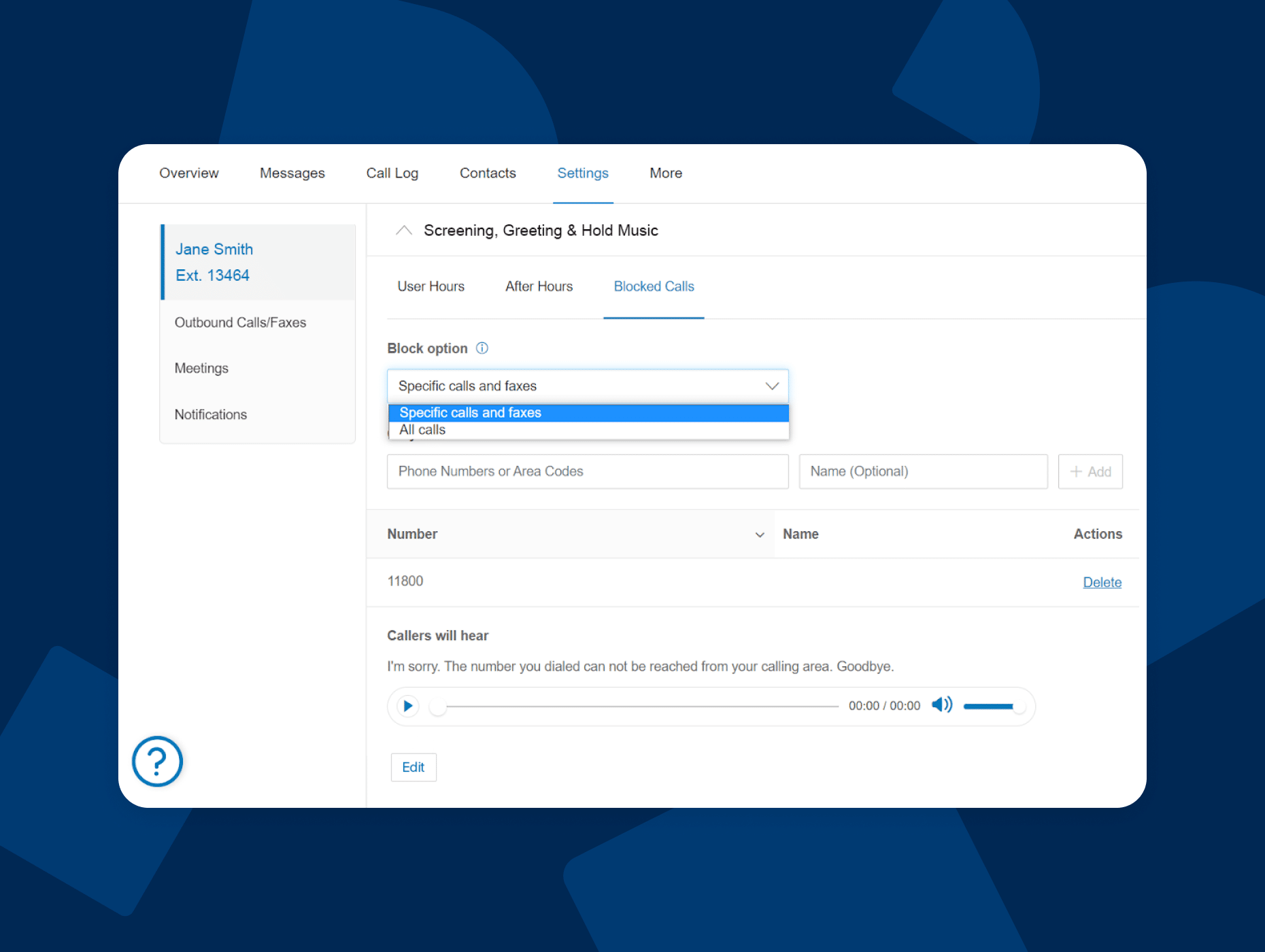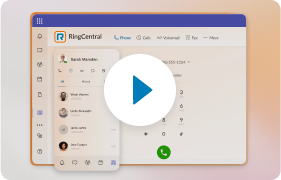Spam calls are not only annoying, but they also pose a threat to your security and safety. A study revealed that Americans receive 2.5 billion spam and unwanted calls on average monthly. That’s a lot of opportunities for malicious actors to steal your information.
In the wrong hands, your details could be used for phone tracking, phishing, or even identity theft. Luckily, there are actions you can take to prevent these issues.
Android and iOS devices have built-in features for blocking certain phone numbers, while mobile carriers and platforms like RingCentral have their own blocking tools. Several third-party apps, like Truecaller, Robokiller, and Hiya, also work to block unsolicited calls.
We discuss these options and more in the following sections.
Block spam calls on iPhone

The best way to stop spam calls, texts, or Facetime calls on your iPhone is to block the harassing number. To do this, go to the Phone app on your device and tap Recents. Then, tap the info icon next to the number you want to block. Select Block Caller and then Block Contact.

Note that this prevents only that specific number from calling you. In other words, spammers and unethical marketers can still contact you with other numbers. A more permanent solution would be to prevent calls from unknown numbers.
To do that, navigate to Settings > Phone > Silence Unknown Callers and switch the toggle to the right. This automatically silences calls from numbers not in your contact list. These calls are then sent to voicemail and appear on your Recent list so you can call back legitimate numbers.

Keep in mind that preventing calls from numbers not in your contact list also means you will miss out on some legitimate calls.
Stop spam calls on Android

The steps for blocking numbers on Android phones will depend on the manufacturer and operating system. But in general, you will open the Phone app and click on Recents. Tap the info icon next to the number you want to block. Select Block and tap Ok when the confirmation prompt appears.

Some Android devices allow you to set automatic block & filter rules for unwanted calls. To do this, navigate to the Phone app. Tap the three-dot symbol in the top-right corner and select Settings. Then, click Caller ID & Spam. Next, activate Filter Spam Calls.
To ensure you don’t miss important calls, whether from a paid or toll-free number, you can activate See Call and Spam ID. If the program offers only this option, just turn that on.
Incoming calls on this list won’t appear as missed calls; instead, they’ll appear in Call history or if the caller leaves a voicemail.
Block spam calls with carrier-provided services
Many mobile carriers have built-in tools that prevent suspected spam calls from reaching your phone. The most popular ones include:
RingCentral

Although RingCentral is not a traditional phone carrier, it offers many carrier-like features. It uses the internet to provide powerful services, making it a VoIP (Voice over Internet Protocol) provider.
RingCentral provides powerful tools to fight spam calls. Its AI-powered spam detection system uses machine learning to identify and block spam calls automatically. This stops many unwanted calls before they reach you.
Users can also set up their own defenses with this platform. You can create a list of numbers to block and send unknown callers straight to voicemail. There’s even a “Do Not Disturb” mode for quiet hours.
In addition, RingCentral safeguards your personal information from potential scammers by blocking calls from hidden numbers.
T-Mobile

Image sourced from engadget.com
T-Mobile offers a free blocking app called Scam Shield for its postpaid and Metro customers. This app can identify and block spam calls before they reach your phone. It also has an enhanced Caller ID feature that displays detailed information on a call so you can decide if it is spam.
A call deemed legitimate carries a Number Verified tag, while a potential spam call will display a “Scam Likely” warning to alert you.
Verizon

Verizon Wireless offers its postpaid users a free version of its Call Filter service on compatible devices. This tool blocks potentially fraudulent calls by automatically sending them to voicemail. However, you can also block unwanted or nuisance calls through the call filter app or My Verizon.
AT&T

ActiveArmor is AT&T’s automatic fraud call-blocking app that detects and blocks calls from likely fraudsters before they reach customers. After the app filters out potential spam calls, it labels them as “nuisance” and sends them to voicemail. The app also checks your passcodes and alerts you when there is a breach, which can be particularly helpful if your passcodes are shared across other cyber and physical security systems.
Try third-party call-blocking apps
Several third-party apps can prevent spam calls from reaching your phone. Some of these apps also offer advanced cybersecurity risk management features to enhance your phone security.
Hiya

Hiya is a popular spam call blocker app that protects you against scams and unknown calls in real-time. It is a comprehensive communication tool with a vast database of known spam numbers and can block them automatically.
Thanks to its reverse lookup feature, you can identify unknown numbers before answering the call. Hiya also uses AI (artificial intelligence) for precise call identification, ensuring users can feel confident in their security.
TrueCaller

TrueCaller is a popular spam-blocking app for Android and iOS users. This app reveals the identity of all incoming callers so that you can decide whether or not they’re legit. It automatically blocks unwanted calls based on known spammers and the numbers you manually add.
TrueCaller also lets you make calls directly from the app. You can also look up names and phone numbers to get information on them.
Call Control

This app is designed to block robocalls before they reach your phone. This automatic call-blocking feature is what makes Call Control really stand out. The app also allows you to create a personal block list to restrict calls from specific numbers.
Another feature of Call Control is its CommunityIQ feature in the premium version. This function consults thousands of community reports and Do Not Call complaints to determine which calls are coming from spammers.
Robokiller

Robokiller is another effective spam-call-blocking app that functions in a unique way. The app has Answer Bots that frustrate spam callers with pre-recorded nonsense. You can even create your own bot responses.
Robokiller also has its own database of known spam callers. However, you can manually add numbers.
Sign up for the Do Not Call Registry

Screenshot from donotcall.gov
Another free solution to block spam calls is adding your number to the Federal Trade Commission’s (FTC) Do Not Call Registry. To do this, call 1-888-382-1222 or send a message to 1-866-290-4236.
You can also join the registry via the website. Go to donotcall.gov and provide your phone number and email address. Then, you will receive a confirmation email with instructions. Follow them, and you are set.
Although, you will have to give it a month to really take effect. Even then, some unethical callers might still infringe the rules. If that happens, report the number directly to the FTC to have it blocked.
Protect your phone number
You can avoid spam calls or the need to use third-party call-blocking apps altogether by just keeping your number safe. Here are some ways to do that:
Don’t share your number if you don’t have to
This is the first step in protecting your phone number. When signing up for a service online or filling out a form, read the fine print. Understand how companies collect your data, as the law requires them to report this information. Only provide your number if it is necessary.
Also, avoid posting your number on social media and other public forums. Doing so makes it easy for fraudsters to find and use your number. It can also make you a target of harassment.
Use a secondary number
If you absolutely have to provide a phone number, consider getting a secondary number. Several virtual phone services can provide a virtual phone number you can use to sign up for a service or place an order. And if you start receiving spam calls, you can easily divert them to this number.
Rent a long-term phone number
These numbers are similar to regular phone numbers, and you can use them whenever phone numbers are required. Rented phone numbers have a fixed location, and you can use them to receive SMS and get a verified code online.
Conclusion
Spam and unwanted calls are the result of your personal information being shared or used without your knowledge. Although they are a nuisance and leave you exposed, there are actions you can take to protect yourself. For instance, you can block spam calls on your smartphone and via your mobile carrier. Implement these solutions and safeguard your data.
FAQs
Are there any downsides to blocking all unknown numbers?
While blocking all unknown numbers can effectively reduce spam calls, it may also prevent legitimate calls from coming through. For instance, important calls from doctors, delivery services, or potential employers might be blocked if they are not in your contacts. To manage this, consider regularly checking your voicemail or using a spam call filtering app that can differentiate between spam and legitimate calls.
How can I protect my personal information from being exposed to spammers?
To safeguard your personal information from spammers:
- Don’t share your phone number publicly on social media or untrusted websites.
- Use a secondary phone number or virtual phone number for online forms or services that require a contact number.
- Be cautious with permissions when installing apps—only allow apps to access your contacts or phone features if absolutely necessary.
- Regularly check your phone bill for any unauthorized charges, which could indicate that your number has been misused.
- Enable two-factor authentication (2FA) on accounts to add an extra layer of security against unauthorized access.
Updated Sep 18, 2024












